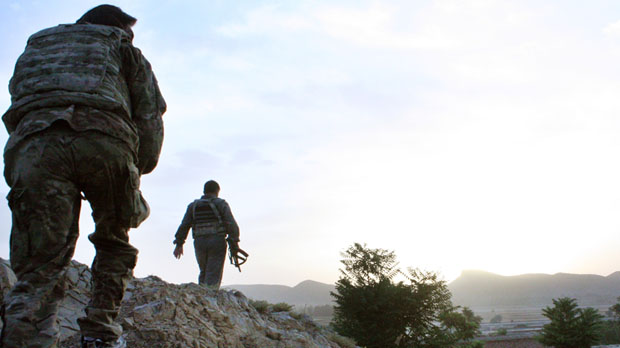Pakistan’s ISI supported Kabul embassy attack, says US
Admiral Mike Mullen claims the Haqqani militant group blamed for an attack on the US embassy in Kabul is a “veritable arm” of Pakistan’s ISI intelligence service.
The Haqqani network, blamed for the recent attack on the US embassy in Kabul, is a ruthless group of insurgents.
Once backed by the CIA during the 1980s when the Soviets occupied of Afghanistan, today the Haqqani network is responsible for carrying out some of the most deadly attacks on US and Nato troops.
Now, in a new low for US-Pakistan relations, America’s top military officer is accusing Pakistan‘s Inter-Services Intelligence Agency of using the militant group as a “veritable arm”.
Admiral Mike Mullen, who steps down this month as chairman of the US Joint Chiefs of Staff, said: “With ISI support, Haqqani operatives planned and conducted a truck bomb attack, as well as the assault on our embassy.”
Read more: Channel 4 News Foreign Editor Ben de Pear blogs on 'lethal' talks with the Taliban
“We also have credible intelligence that they were behind the (28 June) attack against the Inter-Continental Hotel in Kabul and a host of other smaller but effective operations,” he said.
Pakistan’s Interior Minister Rehman Malik has hit back, telling Reuters: “If you say that it is ISI involved in that attack, I categorically will deny it. I categorically deny it.
“We have no such policy to attack or to aid attacks through Pakistani forces or through any Pakistani assistance.”

(Above: US troops hunt members of the Haqqani network in Afghanistan. Getty)
Tense US-Pakistan relations
High-profile attacks have been a blow to Washington’s hopes of sealing a peace deal with the Taliban as it plans to gradually draw down the US force 10 years after the Afghan war began.
There are further claims, from US officials, that the ISI actually directed or urged the Haqqani network to carry out the attack last week on the US embassy and a Nato headquarters in Kabul.
Mullen said the embassy attack and Tuesday’s bombing that killed the former Afghan president, were examples of the Taliban’s shift toward high-profile violence.
More from Channel 4 News: WikiLeaks shows US-Pakistan relations mired in distrust
“These acts of violence are as much about headlines and playing on the fears of a traumatised people, as they are about inflicting casualties – maybe even more so,” Mullen said.
“We must not misconstrue them. They are serious and significant in shaping perceptions but they do not represent a sea change in the odds of military success.”
On Tuesday, the US accused the ISI of using the Haqqani Network to wage a “proxy war”. Pakistan has long been accused of playing a double game; a strategy the US says Islamabad must shift in the future and a strategy the Pakistanis deny.
-
Latest news
-
Laughing Boy: New play tells the tragic tale of Connor Sparrowhawk5m

-
Sewage warning system allows some of worst test results to be left off rating system, analysis shows3m

-
Post Office inquiry: Former CEO didn’t like word “bugs” to refer to faulty IT system4m

-
Israeli soldier speaks out on war in Gaza12m

-
PM’s defence spending boost should be ‘celebrated’, says former Armed Forces Minister4m

-





